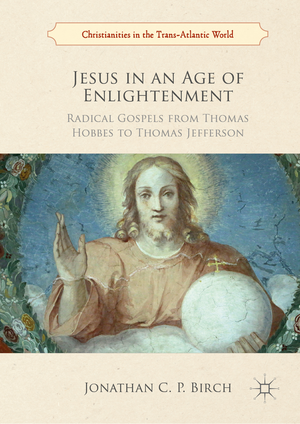Jesus in an Age of Enlightenment: Radical Gospels from Thomas Hobbes to Thomas Jefferson: Christianities in the Trans-Atlantic World
Autor Jonathan C. P. Birchen Limba Engleză Hardback – 29 iul 2019
Din seria Christianities in the Trans-Atlantic World
- 20%
 Preț: 691.26 lei
Preț: 691.26 lei - 15%
 Preț: 470.72 lei
Preț: 470.72 lei -
 Preț: 316.53 lei
Preț: 316.53 lei -
 Preț: 215.33 lei
Preț: 215.33 lei -
 Preț: 391.61 lei
Preț: 391.61 lei -
 Preț: 231.78 lei
Preț: 231.78 lei -
 Preț: 264.59 lei
Preț: 264.59 lei - 18%
 Preț: 789.65 lei
Preț: 789.65 lei - 15%
 Preț: 465.98 lei
Preț: 465.98 lei -
 Preț: 215.54 lei
Preț: 215.54 lei -
 Preț: 198.57 lei
Preț: 198.57 lei -
 Preț: 483.70 lei
Preț: 483.70 lei - 15%
 Preț: 639.73 lei
Preț: 639.73 lei -
 Preț: 382.36 lei
Preț: 382.36 lei -
 Preț: 381.98 lei
Preț: 381.98 lei - 18%
 Preț: 780.52 lei
Preț: 780.52 lei - 18%
 Preț: 724.80 lei
Preț: 724.80 lei - 15%
 Preț: 635.96 lei
Preț: 635.96 lei - 18%
 Preț: 730.47 lei
Preț: 730.47 lei
Preț: 596.36 lei
Preț vechi: 701.60 lei
-15% Nou
Puncte Express: 895
Preț estimativ în valută:
114.12€ • 119.39$ • 94.79£
114.12€ • 119.39$ • 94.79£
Carte tipărită la comandă
Livrare economică 02-16 aprilie
Preluare comenzi: 021 569.72.76
Specificații
ISBN-13: 9781137512758
ISBN-10: 113751275X
Pagini: 480
Ilustrații: XIX, 493 p.
Dimensiuni: 148 x 210 mm
Greutate: 0.76 kg
Ediția:2019
Editura: Palgrave Macmillan UK
Colecția Palgrave Macmillan
Seria Christianities in the Trans-Atlantic World
Locul publicării:London, United Kingdom
ISBN-10: 113751275X
Pagini: 480
Ilustrații: XIX, 493 p.
Dimensiuni: 148 x 210 mm
Greutate: 0.76 kg
Ediția:2019
Editura: Palgrave Macmillan UK
Colecția Palgrave Macmillan
Seria Christianities in the Trans-Atlantic World
Locul publicării:London, United Kingdom
Cuprins
Chapter One: Introduction.- Chapter Two: Imagining Enlightenment – The Historical and Historiographical Context.- Chapter Three: Overture to a Moral Messiah - God, Goodness, and the Heretical Tendency.- Chapter Four: Material Messiah - Hobbes, Heresy, and a Kingdom Not of This World.- Chapter Five: ‘No Spirit No God’ - From the Light of Christ to the Age of Enlightenment.- Chapter Six: What Would Jesus Tolerate? - Reason and Revelation in Spinoza, Locke, and Bayle.- Chapter Seven: The Unity of God and the Wisdom of Christ - The Religious Enlightenments of Joseph Priestley and Thomas Jefferson .- Chapter Eight: Postscript and Conclusion.
Recenzii
“This is an England-centred book, complementing rather than replacing other histories and standard works … . It lends itself to dipping into for leads worth following and could provoke less open minds to reflect on the permanent value of the counter-tradition in Western Christianity which supposes that morals are more important than theological truth.” (Robert Morgan, Modern Believing, Vol. 64 (2), 2023)
“Birch’s invaluable, rigorous, and engaging book does much to further—it will be of vital interest to historians, theologians, and religious studies scholars of all levels, seeking to engage honestly with the complex, pluralistic nature of our collective intellectual history.” (Jonathan Greenaway, Literature and Theology, February 7, 2021)
“Birch’s invaluable, rigorous, and engaging book does much to further—it will be of vital interest to historians, theologians, and religious studies scholars of all levels, seeking to engage honestly with the complex, pluralistic nature of our collective intellectual history.” (Jonathan Greenaway, Literature and Theology, February 7, 2021)
Notă biografică
Jonathan C P Birch teaches in the School of Critical Studies at the University of Glasgow, UK. He is an intellectual historian who specialises in biblical interpretation and Western philosophy.
Textul de pe ultima copertă
This book explores the religious concerns of Enlightenment thinkers from Thomas Hobbes to Thomas Jefferson. Using an innovative method, the study illuminates the intellectual history of the age through interpretations of Jesus between c.1750 and c.1826. The book demonstrates the persistence of theology in modern philosophy and the projects of social reform and amelioration associated with the Enlightenment. At the core of many of these projects was a robust moral-theological realism, sometimes manifest in a natural law ethic, but always associated with Jesus and a commitment to the sovereign goodness of God. This ethical orientation in Enlightenment discourse is found in a range of different metaphysical and political identities (dualist and monist; progressive and radical) which intersect with earlier ‘heretical’ tendencies in Christian thought (Arianism, Pelagianism, and Marcionism). This intellectual matrix helped to produce the discourses of irenic toleration which are a legacyof the Enlightenment at its best.
Caracteristici
Examines the interpretations of Jesus from c.1650 to c.1826 to illuminate the intellectual history of the Enlightenment Demonstrates the persistence of theology in modern philosophy and projects of social reform Explores the religious concerns of Enlightenment thinkers from Thomas Hobbes to Thomas Jefferson
